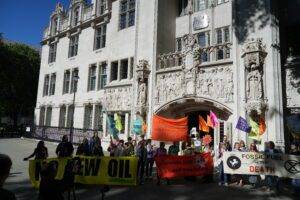
In a landmark ruling, the Supreme Court has declared that Surrey County Council should have assessed the complete climate impact of burning oil from new wells, a decision that could profoundly affect future UK oil and gas ventures.
Historically, planning law has only required the evaluation of environmental impacts during the construction phase of oil wells, not the subsequent usage of the oil produced. This precedent was challenged in a case brought against Surrey County Council by Sarah Finch on behalf of campaigners, a move that now threatens new fossil fuel projects across the UK.
While the Supreme Court did not mandate the rejection of Surrey County Council’s proposal for new oil wells, it ruled that the council should have considered the downstream emissions. This sets a significant precedent, compelling companies to account for these emissions in future project assessments.
“I am absolutely over the moon to have won this important case,” Sarah Finch told her supporters.
The case centres on the Horse Hill oil well in Surrey, which received planning permission to expand operations in 2019. Finch, representing the Weald Action Group, argued that the Environmental Impact Assessment should have included the greenhouse gas emissions from burning the oil, known as downstream emissions. The Supreme Court, in a three-to-two majority, agreed.
Summarising the decision, Lord Leggatt stated that it was “inevitable” the oil from the site would be burned, making the resulting greenhouse emissions a direct outcome of the project that should be considered.
The six wells at Horse Hill are projected to produce 3.3 million tonnes of crude oil over the next two decades. According to Friends of the Earth, burning this oil would result in over 10 million tonnes of CO2 emissions.
Stephen Sanderson, CEO of UK Oil & Gas PLC, described the court’s ruling as “perplexing.” He noted, however, that the company has increasingly shifted its focus towards hydrogen storage over the past few years.
UK Oil & Gas PLC now plans to work with Surrey County Council to amend its planning application, ensuring future production remains below the threshold requiring an environmental assessment.
Campaigners believe this ruling could influence other legal challenges against UK projects, such as the Rosebank oil field and the proposed coal mine in Whitehaven, Cumbria.
“Today’s groundbreaking ruling is a heavy blow for fossil fuel lobbyists,” stated the Weald Action Group. They emphasised the UK’s struggle to meet its carbon reduction targets and its commitment to reducing emissions by two-thirds by 2030.
Given that UK environmental assessment laws partly derive from European legislation, this ruling could also have international ramifications.
Finch’s triumph concludes a five-year legal battle supported by environmental groups including Friends of the Earth and Greenpeace. Although her initial challenge was dismissed by the High Court, the Appeal Court returned a split decision in 2021, leading to the Supreme Court hearing.
Friends of the Earth lawyer Katie de Kauwe called the ruling “a watershed moment” in halting fossil fuel extraction projects in the UK, praising the determination of Finch and the Weald Action Group in achieving this significant victory despite substantial opposition.
“This historic ruling ensures that end-use emissions must now be considered in planning permissions for fossil fuel projects,” de Kauwe added.
Sarah Finch celebrated the decision, stating, “This is a welcome step towards a safer, fairer future. It will be very hard for planning authorities to permit new fossil fuel developments when their true climate impact is clear for all to see.”
The ruling marks a pivotal moment in the UK’s approach to environmental assessments, potentially reshaping the landscape for future oil and gas projects.
Read more:
Supreme Court Ruling Signals Major Shift for UK Oil and Gas Projects





